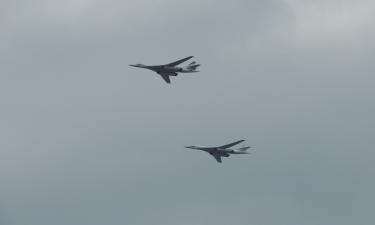RIA Novosti presents the most significant events of the year
RIA Novosti presents a list of the most significant events of the year from the point of view of its correspondents. The list is divided in two, one containing Russian and the other world events.
RUSSIAN EVENTS
1. The drama at the Theater Center in Dubrovka, Moscow: Chechen terrorists break into the building, taking hostages of the audience and actors of the musical "Nord-Ost" - 800 people in all. The special task forces launch an operation to liberate the hostages, during which they eliminate 41 terrorists and liberate 750 hostages. A bomb explosion is prevented, but the terrorist act still claims 129 lives.
2. The president signs the Federal Law of Purchase and Sale of Agricultural Land. The Labor Code, the Code of Administrative Infringements, and the new Code of Criminal Procedure enter into force.
3. The All-Russia Population Census is conducted - the first one in post-Soviet Russia and the ninth since the year 1920. According to preliminary results, the population of Russia amounts to 145 million people.
4. The United States and the European Union acknowledge the market status of the Russian economy. Russia is excluded from the black lists of the Financial Action Task Force on Money Laundering, or the FATF.
5. Krasnoyarsk territory Governor Alexander Lebed dies in a plane crash.
6. The end of media scandals of the previous year. The launching of the TVS TV channel belonging to the non-commercial partnership Mediasotsium on the "Sixth Button." 7. The biggest privatization deal of the year: a 75% parcel of shares of Slavneft sold for 1.86 billion dollars.
8. The winning of the Davis Cup by the Russian men's national team: the first time Russia collected the main trophy of the world team championship.
9. Russia and the European Union work out an agreement on movement of Russian citizens between the Kaliningrad region and the rest of Russia.
10. Scandals surrounding the Russian athletes at the Winter Olympics in Salt Lake City, USA.
WORLD EVENTS
1. The taking of hostages in the Theater Center in Dubrovka, Moscow, explosion in a discotheque in Bali /Indonesia/, and terrorist acts in Mombasa /Kenya/, in Kaspiisk, and even in the traditionally calm Finland draw the attention of the world community and illustrate the growing danger of the terrorist threat.
2. The Euro is introduced into circulation and immediately becomes the US dollar's main competitor as an international payment unit.
3. The bankruptcy of the energy company Enron, the telecommunications giant Worldcom, and other companies engaged in wheeler-dealer finance give rise to a wave of mistrust in the American economy and prompt a serious crisis in exchanges around the world.
4. The setting up of the Russia-NATO Council in the "format of twenty" and the alliance's approach to the very borders of Russia as it invites seven new members - countries of Central and Eastern Europe, including the Baltic countries.
5. Sharp aggravation of the situation around Iraq. International inspectors resume their work in the country, but the threat of US-led military action against Baghdad nevertheless remains.
6. The decision to enlarge the European Union by admitting ten countries of Central and Eastern Europe. EU leaders announce that the new European Union is destined to be one of Russia's main strategic partners.
7. The rise of ultra-right powers in Europe. A European sensation in the person of nationalist Jean-Marie le Pen, who reaches the second round of the French presidential election. The La Liste Pim Fortuyn movement comes second in the parliamentary elections in the Netherlands. Ultra-rightists consolidate their positions in Italy, Switzerland, Portugal and other countries of the Old World.
8. Full renewal of the Chinese leadership at the 16th Congress of the ruling Communist Party. A young generation of pragmatic leaders heraded by the 59-year-old Hu Jintao comes to power. The ex-triumvirate ex-General Secretary Jiang Zemin, speaker Li Peng and Premier of the State Council Zhu Rongzhi are left out of the Central Committee of the Communist Party.
9. Denouncement of the 1972 ABM Treaty, the START-2 Treaty and the Russia-US Agreement on the Reduction of Strategic Offensive Potentials, which envisages sizeable reduction of the amount of nuclear warheads. Presidents of Russia and the USA speak about reconsideration of the national security concept. The struggle against international terrorism becomes a priority.
10. Devastating floods in Europe cause great damage to material, cultural and nature values of several countries, the Czech Republic and Germany in the first place.
Subscribe to Pravda.Ru Telegram channel, Facebook, RSS!





